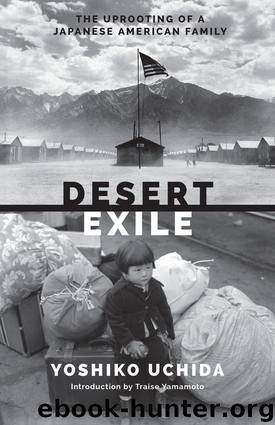Desert Exile (Classics of Asian American Literature) by Yoshiko Uchida & Yoshiko Uchida

Author:Yoshiko Uchida & Yoshiko Uchida [Uchida, Yoshiko]
Language: eng
Format: azw3
ISBN: 9780295806532
Publisher: University of Washington Press
Published: 2015-10-28T16:00:00+00:00
Plate in hand,
I stand in line,
Losing my resolve
To hide my tears.
I see my mother
In the aged woman
who comes,
And I yield to her
My place in line.
Four months have passed,
And at last I learn
To call this horse stall
My family’s home.
Yukari
6
Tanforan: City behind Barbed Wire
ON OUR THIRD SUNDAY IN CAMP, WE HAD OUR FIRST VISITORS from outside, one of my father’s business friends and his wife. A messenger came to notify us of their arrival, and we hurried to the administration building to meet them, since visitors were not permitted beyond that point.
“What can we do to help?” they asked us. “Let us know if there is anything at all we can do.”
They were the first of many non-Japanese friends who came to see us offering their concern, support, and encouragement. All of them came laden with such welcome snacks as cookies, cakes, candy, potato chips, peanut butter, and fruit. We were enormously grateful for these gifts and for other packages that came through the mail (all examined before we received them), for they not only gladdened our hearts, they supplemented our meager camp diet. Some friends came faithfully every week, standing in line from one to three hours for a pass to come inside the gates.
Packages from our friends outside enabled many of us to indulge in late evening snack parties which were popular and frequent. The heavy use of hot plates put such a strain on the circuits, however, that entire barracks and stables were sometimes plunged into sudden and total darkness, causing a hasty unplugging by all concerned.
Every weekend and often even during the week, the grandstand visiting room was crowded with throngs of outside visitors. When we had no visitors of our own, my friends and I would sometimes go to the grandstand just to watch the people coming and going, for even though they were strangers to us, seeing them gave us a brief sense of contact with the outside world.
Our own visitors included not only my father’s business associates, but our neighbors, my piano teacher, my mother’s former Doshisha teacher who now lived in California, and many church and university people we had known over the years. One day the head of the Northern California Congregational Conference came to see us, as did on other days the chairman of the Pacific Coast Committee on American Principles and Fair Play, Dr. Galen M. Fisher (a good friend of my father’s); the associate dean of women at the University of California (she had been on the same ship with us when we returned from our trip to Japan); the secretary of the YWCA; and others associated with social action groups. They came because they were our friends, but also because they were vitally concerned over the incarceration of one group of American citizens on the basis of race, and the denial of our constitutional rights.
When the evacuation took place, one of the first committees formed was the Committee on American Principles and Fair Play founded by Dr. Fisher. Its purpose was “to support the principles enunciated in the Constitution of the United States .
Download
This site does not store any files on its server. We only index and link to content provided by other sites. Please contact the content providers to delete copyright contents if any and email us, we'll remove relevant links or contents immediately.
| African-American Studies | Asian American Studies |
| Disabled | Ethnic Studies |
| Hispanic American Studies | LGBT |
| Minority Studies | Native American Studies |
Cecilia; Or, Memoirs of an Heiress — Volume 1 by Fanny Burney(31332)
Cecilia; Or, Memoirs of an Heiress — Volume 3 by Fanny Burney(30934)
Cecilia; Or, Memoirs of an Heiress — Volume 2 by Fanny Burney(30889)
The Great Music City by Andrea Baker(21313)
We're Going to Need More Wine by Gabrielle Union(18072)
Bombshells: Glamour Girls of a Lifetime by Sullivan Steve(13108)
Pimp by Iceberg Slim(12931)
All the Missing Girls by Megan Miranda(12747)
Fifty Shades Freed by E L James(12451)
Norse Mythology by Gaiman Neil(11883)
Talking to Strangers by Malcolm Gladwell(11876)
Crazy Rich Asians by Kevin Kwan(8349)
Mindhunter: Inside the FBI's Elite Serial Crime Unit by John E. Douglas & Mark Olshaker(7834)
The Lost Art of Listening by Michael P. Nichols(6472)
Enlightenment Now: The Case for Reason, Science, Humanism, and Progress by Steven Pinker(6405)
Bad Blood by John Carreyrou(5769)
The Four Agreements by Don Miguel Ruiz(5511)
Weapons of Math Destruction by Cathy O'Neil(5036)
We Need to Talk by Celeste Headlee(4868)
